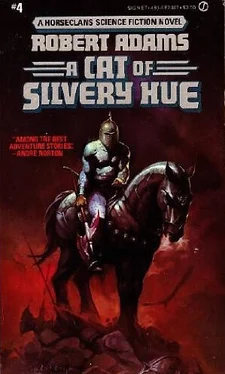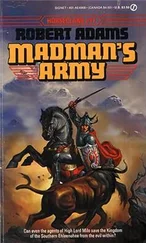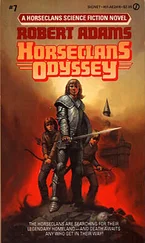And so, when they again took to horse, Staisee and his lancers—whose usual functions were those of point riding and flank guarding—found themselves to have become the main body, formed in a column of fours and taking the road at a brisk trot while eating the dust of the knot of heavily armed nobility who rode the van. Chief Hwahltuh and his clansmen had been given the job they did Best; they rode in a wide-spreading arc, well ahead of the column. A dozen Freefighters secured either flank, while the remainder guarded the rear.
But the precautions proved needless, for isolated stragglers—all quickly dispatched by the Sanderz clansmen—and a couple of foundered horses were the only living creatures they chanced across before the walls of Morguhnpolis loomed before them.
With Bili and Milo in the lead, the van closed up behind the knot of Sanderz men, just out of bowshot of the west gate and its flanking tower. As the city had been built upon hilly ground, some few portions of the streets were visible over the walls, but these all appeared as strangely lifeless as the empty walls themselves.
Old Komees Hari kneed his charger up beside Bili, growling, “Son, something stinks here. It needs no tracker to tell that some fair-sized bodies of men were on this road ahead of us. Why aren’t the buggers on the walls?”
The Confederation commander walked his mount into the group, saying, “Perhaps the rebels’ leader realized that such old-fashioned walls and towers couldn’t be held.”
Vahrohnos Spiros Morguhn shook his head. “Not that damned Myros. He’d hold Morguhnpolis as long as life remained in his wretched carcass! He’s always felt that it, rather than Deskati, should be his rightful patrimony. We warned Hwahruhn it was a mistake to make him city governor of the capital. More than likely he’s trying to make the city look deserted so we’ll be tricked inside to be butchered at his leisure.”
“No, vahrohnos,” the High Lord disagreed. “Were such the case, that gate would be open.” He turned to Bili. “Have you tried fargathering?” “Yes, my lord.” “And?”
“Nothing, my lord, which could mean something or nothing. I tried fargathering during the siege of Behreezburk and got the same results.”
Milo shrugged. “Well, gentlemen, we accomplish damn-all in sitting here and speculating. Prehsvootehros, some of your more agile men should be able to top that wall. Then, if things are as they seem, they can open the gate to the rest of us.”
With the gate tower strongly manned, well-armed patrols trickled out through the empty streets, the lancers guided by Raikuh’s Freefighters, most of whom had formerly been Morguhnpolis city guards and knew well each alley and byway. All rode warily, visors down and beavers up, steel bared or lances presented, archers’ bows strung with one arrow nocked and one or two more ready in the fingers of the bowhand.
Thoheeks Bili and the High Lord, with Vahrohnos Spiros, Komees Hari, Master Ahlee, Chief Hwahltuh Sanderz and Clanbard Gil Sanderz, the hulking Komos Morguhn and one Khlai Ehsmith, a lieutenant of the Confederation lancers, were trailed by Geros, three or four Sanderz clansmen and a couple of Freefighters.
The party rode directly for the palace of the city governor, but walking their mounts no less warily than the other patrols, eyes constantly scanning house fronts and deserted shops, the mouths of alleys or intersecting streets.
The steel-shod hooves rang on the cobbles, saddles creaked and bridle chains jangled discordantly, armor clanked and clattered as the riders turned to left and right. But there were no other sounds … and all found this silence eerie, threatening. And when the High Lord’s chestnut gelding suddenly reared, startled, every sword was instantly ready.
A scarred, rangy tomcat followed close on the heels of the scuttling rat which had spooked the warhorse, making a quick, practiced kill in the center of the street. Heedless of the column of horsemen, the cat stalked away, bearing his feebly twitching prey between his jaws.
Pigeons strutted the small square before the palace, fluttering up in a gray-white cloud before the horsemen. Like the city gates, the palace gate was closed and barred. But the low wall was easily scaled, and soon the noblemen were dismounting in the minuscule courtyard, scrutinizing the facade of the palace, whose windows stared back sightlessly, like the empty eyesockets of a bleached skull. All of the palace doors were secured from within, but the main portals, despite their showy brass sheathing, required but two hard swings of a jerry-rigged ram before they slammed splintering asunder.
Bili was first to stalk into the foyer, his axe at the ready, the clanking of his armor echoing from wall to marble wall. Halting in the center of the dim, cool chamber, he dropped his beaver and roared.
“Vahrohnos Myros, you rutting rebel, you perverted traitorous swine, come out and meet the death you’ve so long cheated! Or do you lack the courage, you forsworn, buggering bastard?”
But once the echoes had ceased to carom off the muraled walls and high, carved ceiling, only silence answered his challenge. Turning to the group which had followed him, he grounded his heavy axe and shrugged.
“Of course, we’ll search, but my fargathering senses no menace within these walls. Where could all the dogs be hiding?”
“It is possible,” commented the High Lord slowly, “that there really is no one left in the city.”
Master Ahlee carefully sheathed his double-curved saber. “The High Lord supposes then that the rebel lords drove out the inhabitants, barred the gates and then went down the walls?”
High Lord Milo nodded. “Either that or … these old Ehleen cities often are honeycombed with subterranean passages, both connecting important buildings and giving a hidden means of entering or leaving their confines.”
Spiros Morguhn shook his head briskly. “There’re no records of any such thing in Morguhnpolis, my lord, nor even any legends of such.”
“Since they generally were used for secret or clandestine purposes, by the old Ehleenee,” Milo said, “there were probably never any records to begin with. And since, as I recall, Morguhnpolis fell by storm, the Ehleen governor or lord could have taken many secrets to his grave. But this is all supposition, gentlemen—we’ll not truly know until we search.”
He turned to Staisee. “Prehsvootehros, mindcall your other troop and bid them ride straight to the palace. I’d feel better with more force behind me, ere I start probing this place.”
Drehkos and his party had not progressed far when they chanced upon a small detachment of Vawnee cavalry, who had halted to bury their former commander, freshly deceased of wounds sustained the night before. Fortunately this band had lost some third of its original numbers in the firelit debacle below Morguhn Hall but had retained most of the now-riderless horses; consequently, all members of the allied party were able to ride when they left the nobleman’s grave and turned their faces west.
The only remaining Vawnee gentleman was a sixteen-year-old nephew of the dead commander, one Kleetos of Mahrtospolis, who was overjoyed to confer his unwanted responsibilities upon the middle-aged Drehkos. The Vawnee seemed much relieved at this transference of authority. And, sensing their immediate trust in him, Drehkos had not the heart to tell them the cold truth.
Although reared to the sword and the horse, as were all Kindred and most Ehleen noblemen, Drehkos Daiviz had never acquired any formal military training or experience. When, thirty-odd years before, his brother, Hari, and the bulk of the other young Kindred of Morguhn and Daiviz had ridden to the Middle Kingdoms to seek fortune and adventure as members of the Freefighter condotta formed by Djeen Morguhn, Drehkos had flatly rejected all blandishments and remained in the duchy of his birth.
Читать дальше












